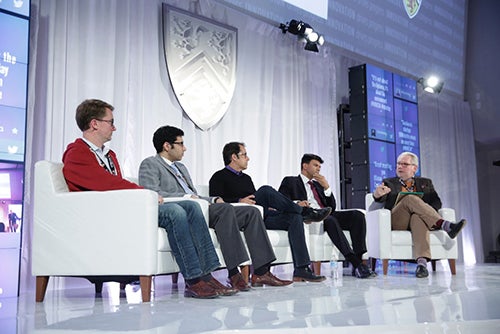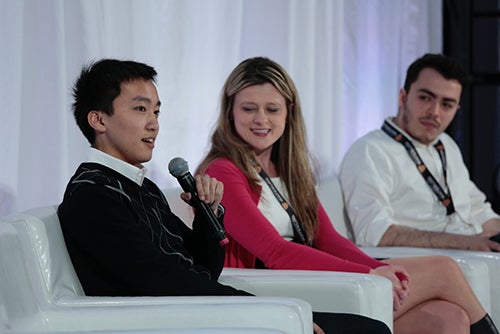
‘Everyone is born global’
Waterloo summit takes innovation conversation to the international stage

Waterloo summit takes innovation conversation to the international stage

Peter Harder (right) moderates a panel discussion on Managing Global Connectedness featuring Torsten Kolind, Abdallah Al-Hakin, Ricardo Sodre and Prashant Pathak (left to right).
Every business, every idea and every product being created right now, is being “born global.”
That’s the takeaway from the Waterloo Innovation Summit, which ended its two-day run Tuesday at the University of Waterloo.
Entrepreneurs, venture capitalists, students, government officials and academics gathered at the Mike & Ophelia Lazaridis Quantum-Nano Centre to share a conversation about innovation, and how the University’s role in a high-tech hub can benefit the local and national economy.
Although there was much discussion about whether a company should try to grow in Canada or go south of the border, the message that kept coming through was the global nature of the commercialization of innovation.
Torsten Kolind, co-founder and CEO of startup enabler YouNoodle put it bluntly: when it comes to startups everywhere, “Everyone is born global.”
“It’s not just, ‘Does this work in Waterloo, or Ontario, or Canada — does it work globally’,” he challenged the crowd. “Make sure you are looking way beyond what is happening on campus.”
Ricardo Sodre, founder and CEO of Project-1, a Brazilian investment vehicle, uses the term “micro-multinationals” for the startups seeking a global client base.
Communitech president and CEO Iain Klugman, in a panel on the role of government in the innovation economy, said Canadians have to revisit their approach to competitiveness: “We’re not competing with Nova Scotia — we’re competing with the world.”
University of Waterloo board chair Kevin Lynch, moderator for the panel, noted, “We can be a disruptor or the disrupted. Which do we want to be? Because the status quo is not a viable long-term model.”
Michael Horgan, one of several deputy ministers on the panel, said, “The tectonic plates of the Canadian economy are changing,” and suggested that multiple efforts to market one region or one agency abroad were “fractionating our efforts” to sell the national brand. “We have to brand Canada.”
Peter Harder, senior policy advisor to Dentons Canada LLP, and a former long-serving deputy minister in several federal financial portfolios, said, “We have to find a method to build Canadian participation in the global economy of the 21st century. . . . What better base than Waterloo, the leader of Canada’s innovation agenda, to take that to the world?”
Student success stories
A transparent film that turns every window into a billboard, an on-demand language tutor, an indoor navigation mapping system: these are three University of Waterloo-linked startups, preparing for prime time, that were in the spotlight at the Waterloo Innovation Summit on Tuesday.
And their creators, in turn, put the University in the spotlight, crediting it with giving them the tools to build their own companies.

Entrepreneurs Hongwei Liu, Camelia Nunez and Matin Esfahani share their success stories.
Matin Esfahani is CEO of Lumotune, which uses multi-layer transparent films to turn any glass surface into a display billboard. Key is the computer-controlled nanotechnology that allows portions of the film to become opaque, creating words or images. “We are monetizing glass space . . . this is the future of glass,” Esfahani said, “This would not have been possible without the Waterloo community. We graduated into an ecosystem made for us.”
Camelia Nunez is the co-founder of Milao, an on-demand language tutor. Although she holds a PhD in linguistics and lectured at the University of Waterloo, she was also a student, taking several courses in business and entrepreneurship. Within a year, she created and beta-tested her company on-campus and is now looking to get Milao into 10 universities in Canada and the United States. “In Waterloo, things happen fast,” she said.
Hongwei Liu came to entrepreneurship because he liked air conditioning. He told the crowd he had been a co-op student at RIM, but moved to the University’s Velocity program because the dorms had air conditioning. Once he got there, he found an environment that was “cool” to build things in. The result was that he co-founded MappedIn, an indoor wayfinding program that replaces the “You are here” display boards in malls and offices. The company has hired its 14th person, and hopes to have 30 staff by year-end. He credits the mentorship he received from successful new entrepreneurs in the ecosystem supported by the University. In that ecosystem, he said, “you pay it forward.”
Observations from the experts:
Ricardo Sodre, founder and CEO of Project-1, a Brazilian investment vehicle: “Don’t be afraid to fail. Take chances, Take risks. Learn from your failures.” He pointed out that the Finnish game company Rovio produced 51 games before its global success with Angry Birds.
Torsten Kolind, co-founder and CEO of startup enabler YouNoodle: “Travel, go abroad. Build some company somewhere. What will bring globalization into this campus will be you returning with those experiences.”
Prashant Pathak, CEO of venture capital firm Ekagrata Inc.: “Go beyond RIM, RIM ‘was.’ Now go into the future. Go beyond Canada and go beyond products.”
Susan Fonseca, diversity ambassador at the executive education agency, Singularity University, urged women who want careers in tech to turn to woman@thefrontier: “a global community of innovators, entrepreneurs and game-changers.” She said she is “looking for women who are changing the way people live.”
Eric Migicovsky, founder and CEO of Pebble Technology, the company behind the Pebble watch, talked about his experience of building a prototype with parts scavenged from an old cellphone, and being head of a company that is making $60 million a year. He told startups to pay attention to the product-market fit. “Make something that people want. It’s up to the startup to figure out what people want.”
Michael Litt, CEO and co-founder of video marketing platform Vidyard, used the analogy of a ladder to describe the difference between the Waterloo ecosystem and Silicon Valley: the University has a short ladder “with a lot of rungs” and lots of people to help you climb. “Silicon Valley has a tall ladder, but few rungs at the bottom … you need a lift.”

Read more
Alum and founder Marc Lafleur shares how his entrepreneurship playbook has changed since selling his first company

Read more
How Doug Kavanagh’s software engineering degree laid the foundation for a thriving career in patient care

Read more
Upside Robotics secures new funding to accelerate the future of sustainable farming
The University of Waterloo acknowledges that much of our work takes place on the traditional territory of the Neutral, Anishinaabeg, and Haudenosaunee peoples. Our main campus is situated on the Haldimand Tract, the land granted to the Six Nations that includes six miles on each side of the Grand River. Our active work toward reconciliation takes place across our campuses through research, learning, teaching, and community building, and is co-ordinated within the Office of Indigenous Relations.